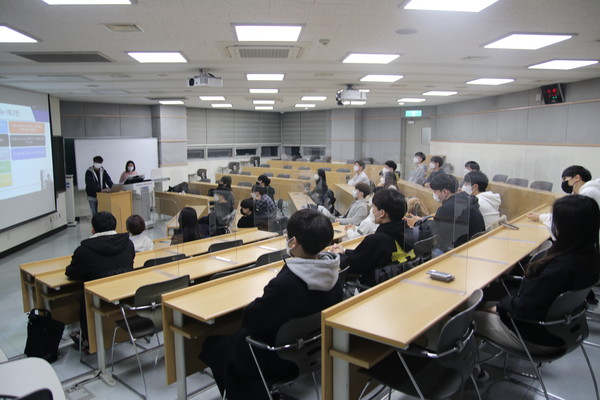KAIST announced a return to in-person classes for Spring 2022. This would mark a break from two years of online classes, though some classes would still be conducted online. However, the school also stressed the need to adhere to coronavirus guidelines, with the sharp rise in both Korea and KAIST’s coronavirus cases demonstrating the need for caution.

On February 15, KAIST’s Student Policy Team announced a plan to implement offline classes following Korea’s ‘Step-by-step Recovery’ policy. Classes are to be held offline by default, though certain classes will be conducted online, and even offline classes will be broadcast online (hybrid classes) for students unable to attend the offline classes for various reasons: vaccinations, quarantine, sickness, or currently being overseas in the case of international students. Even without special reasons, students can opt to take online classes until March 24 unless there is another change in the school’s COVID-19 policy, due to considerations regarding the fast spread of Omicron.
These guidelines may not apply to all courses, and some courses require offline attendance, like lab or exercise courses, so students still need to verify how classes will be conducted. Students who mainly attend the online version of a hybrid class may also be subject to different grading criteria depending on the wishes of the course instructor, who may apply a SU grading system to certain students.
Meanwhile, students can take excused absences for contracting the coronavirus, being a close contact, or for having symptoms. Excused absences are limited to a maximum of 10 days for students that get COVID-19, so students needing long absences are advised to take a leave of absence. The coronavirus situation has made it possible for both undergraduate freshmen in their first semester, who aren’t normally permitted to take a leave of absence, and other students to take normal or illness-related leaves of absence for causes related to COVID-19.
With the rise of the Omicron variant, Korea’s coronavirus cases have seen a steep rise, with daily cases surpassing 380,000 on March 12. The case has been similar in KAIST, despite the preventative measures, with 138 students testing positive on March 10. This, alongside the need for faculty and students to readjust to offline classes after a long period of mostly online activities, may be the reason why many classes are currently being held online. In addition, offline classes require the regular disinfection of lecture rooms, the constant vigilance of the disease control manager to follow coronavirus guidelines, and the cooperation of students in wearing masks and in disinfecting their chairs and desks. These measures, however, cannot counter the possibility of transmissions within cafeterias, which are bustling with life, nor those inside dorms, where students share toilets and rooms.
Thus, as another counter-measure, KAIST recommends periodic coronavirus testing, preferably every week, stressing the presence of a mobile testing station within the campus. Until April 13, testing positive on a Rapid Antigen Test conducted by professionals, which isn’t available on-campus, will also be taken as a positive test result. Students who test positive off-campus have the additional responsibility of notifying the school’s COVID-19 Response Team.
On March 8, a letter from the Provost announced that students who test positive for coronavirus starting from that day will be sent home instead of being quarantined at Hwaam Hall. The decision was brought about by Hwaam Hall being overfull due to the large number of positive cases. Only students who don’t have a residence in Korea, whose residence in Korea is in Jeju Island, or whose family members have medical conditions that restrict the student’s return home won’t be sent home. While this sets up difficulties on the part of the students, especially with those that don’t have access to a private form of transportation, the decision was stated as necessary.
While starting offline classes may mark a return to normalcy, it is clear, from the high COVID cases and the quickly-changing coronavirus policy, that KAIST may have been hasty in stepping toward a post-COVID life.

